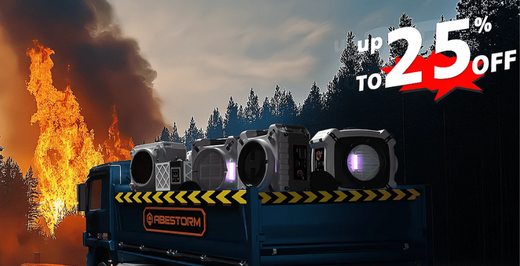In any woodworking environment, the air is thick with more than just creativity and craftsmanship. It's also laden with wood dust, a byproduct as inevitable as it is hazardous. This fine particulate matter, while seemingly innocuous, poses significant health risks and can compromise the safety and efficiency of your workspace. Enter the wood shop dust collector: a game-changer in managing and mitigating the omnipresent dust in wood shops.
Woodworking, a profession and hobby celebrated for its ability to transform raw materials into pieces of art and utility, also comes with its share of occupational hazards. Among these, wood dust stands out not only for its ubiquity but also for its potential to harm both the craftsman and their craft. The importance of maintaining a clean and healthy work environment cannot be overstated, making dust collectors not just beneficial but essential for any wood shop.
In this blog, we delve into the world of woodshop dust collectors, exploring how they work, the risks associated with wood dust, and the transformative impact these systems can have on your workspace. Join us as we uncover the benefits of integrating a dust collector into your wood shop, with a special focus on the innovative solutions offered by Abestorm.
Understanding Wood Dust and Its Risks
Wood dust, the fine particles produced during the cutting, grinding, sanding, and polishing of wood, is more than just a nuisance. It's a pervasive byproduct of woodworking that can significantly impact both health and safety in the workshop. Depending on the type of wood being worked on, wood dust can range from larger chips to microscopic particles, each posing its own set of challenges.
Health Risks
The health implications of prolonged exposure to wood dust are well-documented. Respiratory problems are among the most immediate concerns, with symptoms ranging from nasal irritation and coughing to more severe conditions such as asthma and chronic bronchitis. Moreover, certain types of wood dust have been classified as carcinogenic, linked to an increased risk of nasal and sinus cancer. The fine particles can easily be inhaled, making their way deep into the lungs and causing long-term health issues.
Safety Risks
Beyond health, wood dust creates significant safety hazards within the workshop. Accumulations of fine dust can become combustible under certain conditions, posing a fire risk. Additionally, dust can compromise the functionality of machinery and tools, leading to potential malfunctions and accidents. Visibility is another concern, as airborne dust can obscure vision, making the workshop environment both inefficient and dangerous.
The Basics of Wood Shop Dust Collectors
A wood shop dust collector is designed to address the challenges posed by wood dust, offering a solution that not only cleans the air but also enhances the overall safety and efficiency of the workshop. Understanding how these systems work and the types available is crucial in choosing the right dust collector for your needs.
How They Work
Dust collectors operate by drawing in air from the workshop, filtering out dust particles, and then recirculating the clean air back into the space. This process involves a series of components including fans, filters, and dust collection bags or bins. The efficiency of a dust collector is determined by its ability to capture both large chips and fine dust particles, ensuring a comprehensive clean.
Types of Dust Collectors
There are several types of dust collectors suitable for wood shops, each with its own set of advantages:
Single-stage Dust Collectors: These systems use a single filter to capture dust particles. They are typically more suitable for smaller workshops or those with limited dust production.
Two-stage Dust Collectors: These systems first separate larger particles into a bin before passing the air through a filter to capture finer dust. They are ideal for larger operations with more significant dust production.
Portable Units: Portable dust collectors are designed for flexibility, allowing you to move the unit to where it's most needed. This is particularly useful in workshops where operations are not fixed to one location.
When considering a dust collector for your workshop, it's essential to look at the specific needs of your operation. Factors such as the size of your workshop, the volume of dust produced, and the types of woodworking processes you engage in will all play a role in determining the best fit. For those looking for advanced solutions, exploring the industrial air purification options offered by Abestorm can provide both efficiency and reliability, ensuring your workshop remains a safe and clean environment.
Benefits of Using a Dust Collector in a Wood Shop
The adoption of a dust collector in a wood shop brings a multitude of benefits, directly impacting the health and safety of the environment, as well as operational efficiency. Here’s how a dust collector can transform your workspace:
Improved Air Quality
The primary function of a dust collector is to filter out harmful dust particles from the air, significantly improving the air quality within the workshop. This leads to a healthier environment for everyone in the workshop, reducing the risk of respiratory problems and other health issues associated with wood dust exposure.
Enhanced Safety
By effectively managing wood dust, dust collectors minimize the risk of fire hazards caused by combustible dust accumulations. Additionally, with reduced dust in the air and on surfaces, visibility is improved, and the likelihood of accidents related to slipping or machinery malfunction decreases.
Increased Efficiency and Productivity
A clean workshop is a more efficient one. Dust collectors keep machines and tools free from dust buildup, ensuring they operate at peak performance and require less maintenance. This not only extends the lifespan of your equipment but also improves the quality of your woodwork, as clean air means fewer defects in finishes.
Compliance with Health and Safety Regulations
Using a dust collector helps wood shops meet the stringent health and safety regulations set by authorities. This not only protects the business from potential fines and legal issues but also demonstrates a commitment to the well-being of employees and customers.
How to Choose the Right Dust Collector for Your Wood Shop
Selecting the appropriate dust collector for your wood shop involves considering several key factors to ensure it meets your specific needs. Here’s what to keep in mind:
Assess Your Workshop’s Size and Dust Production
The size of your workshop and the amount of dust it produces are critical factors in choosing a dust collector. Larger spaces with high dust production will require more powerful systems with greater capacity, such as those found in Abestorm’s industrial air purification collection.
Consider the Specific Requirements of Your Operations
Think about the types of woodworking processes you undertake and the kinds of wood you work with. Different processes and materials can produce varying amounts of dust, which may affect the type of dust collector you need. Portable units might be ideal for smaller or more varied operations, while fixed systems could be better for larger, more standardized workshops.
Quality and Reliability Matter
Investing in a high-quality, reliable dust collector pays off in the long run. Look for systems that offer efficient filtration, durable construction, and ease of maintenance. Abestorm’s range of dust collectors is designed with these qualities in mind, ensuring that you invest in a solution that will serve your workshop well for years to come.
Conclusion
The significance of a wood shop dust collector extends far beyond mere dust removal. It plays a pivotal role in ensuring a healthy, safe, and efficient working environment, directly contributing to the quality of the work produced and the well-being of those who produce it. By understanding the risks associated with wood dust, the basics of how dust collectors work, and the benefits they offer, wood shop owners and operators can make informed decisions about the best dust management solutions for their needs.
As you consider integrating a dust collector into your workshop, remember that not all systems are created equal. Assessing your specific needs and choosing a reliable, high-quality system like those offered by Abestorm can make all the difference in transforming your workspace into a cleaner, safer, and more productive environment.









Shop For Dehumidifier